|
|
|
Sort Order |
|
|
|
Items / Page
|
|
|
|
|
|
|
| Srl | Item |
| 1 |
ID:
077228
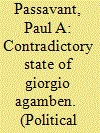

|
|
|
|
|
| Publication |
2007.
|
| Summary/Abstract |
I argue that Giorgio Agamben employs two, contradictory theories of the state in his works. Earlier works, such as The Coming Community and Means without End, suggest that the state today functions as an aspect of the society of the spectacle where spectacle is the logical extension of the commodity form under late capitalism. This part of Agamben's work attributes a determined character to the state and a determining power to the economic forces of capitalism that conditions particular forms of the state. Later work, such as Homo Sacer: Sovereign Power and Bare Life and State of Exception, are preoccupied with the logic of juridical sovereignty and the increased frequency of states of emergency. This part of Agamben's work attributes a determining strength to the state under current conditions. Although his earlier work provides a more coherent narrative of how it is possible to move from contemporary society to ideal community, it does not provide the theory of political action necessary to overcome the power of the state he describes when he theorizes the state in Homo Sacer and State of Exception. None of the three possibilities of political action present in his later works provides passage beyond state sovereignty without violating his philosophical commitments.
|
|
|
|
|
|
|
|
|
|
|
|
|
|
|
|
| 2 |
ID:
077447


|
|
|
|
|
| Publication |
2007.
|
| Summary/Abstract |
The conflict in Iraq has been portrayed as "ethnic" civil war, a radically different conflict from "ideological" wars such as Vietnam. We argue that such an assessment is misleading, as is its theoretical foundation, which we call the "ethnic war model." Neither Iraq nor Vietnam conforms to the ethnic war model's predictions. The sectarian conflict between Shia and Sunni militias is not simply the outcome of sectarian cleavages in Iraqi society, but to an important extent, a legacy of U.S. occupation. On the other hand, although Vietnam was a society riven by ethnic cleavages, the Vietnam War also fails to conform to the ethnic war model. We show that there is no necessary overlap between ethnic conflict and ethnic war. Some ethnic conflicts evolve into ethnic wars, and others develop dynamics virtually indistinguishable from those of ideological civil wars. We suggest that the state's role is essential in transforming conflicts into either ethnic or irregular wars. We conclude with an analysis of the current situation and future prospects in Iraq
|
|
|
|
|
|
|
|
|
|
|
|
|
|
|
|
| 3 |
ID:
077449


|
|
|
|
|
| Publication |
2007.
|
| Summary/Abstract |
In shifting from nationalist/statist to neoliberal economic policies, states seek out and build alliances with other advocates-especially large capital-and work to disorganize political opponents-including small business. This article examines the politics of the private sector's involvement in trade liberalization in the developing world through a study of Mexico's proposal, negotiation, and ratification of the 1994 North American Free Trade Agreement (NAFTA). The article identifies three instruments that the Mexican state used to construct politically crucial support for NAFTA on the part of domestic business: control over political representation, material concessions to potential critics, and careful strategic framing
|
|
|
|
|
|
|
|
|
|
|
|
|
|
|
|
| 4 |
ID:
077229
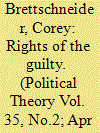

|
|
|
|
|
| Publication |
2007.
|
| Summary/Abstract |
In this essay I develop and defend a theory of state punishment within a wider conception of political legitimacy. While many moral theories of punishment focus on what is deserved by criminals, I theorize punishment within the specific context of the state's relationship to its citizens. Central to my account is Rawls's "liberal principle of legitimacy," which requires that all state coercion be justifiable to all citizens. I extend this idea to the justification of political coercion to criminals qua citizens. I argue that the liberal principle of legitimacy implicitly requires states to respect the basic political rights of those who are guilty of committing crimes, thus prohibiting capital punishment.
|
|
|
|
|
|
|
|
|
|
|
|
|
|
|
|
| 5 |
ID:
077450


|
|
|
|
|
| Publication |
2007.
|
| Summary/Abstract |
Unemployed and informal workers seem an unlikely source of large-scale collective action in Latin America. Since 1997, however, Argentina has witnessed an upsurge of protest and the emergence of unusually influential federations of unemployed and informal workers. To explain this puzzle, this article offers a policy-centered argument. It suggests that a workfare program favored common interests and identities on the part of unemployed workers and grassroots associations, allowing them to overcome barriers to collective action. State responses to demands for workfare benefits generated a pattern of protest and negotiation that strengthened those groups and dramatically expanded social policy
|
|
|
|
|
|
|
|
|
|
|
|
|
|
|
|
| 6 |
ID:
077451
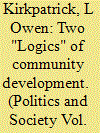

|
|
|
|
|
| Publication |
2007.
|
| Summary/Abstract |
Two Community Development Corporations (CDCs) in Oakland, California, anchor the following analysis. These legally homogenous organizations have implemented similar "low-income" redevelopment projects widely hailed as representing a single successful blueprint for urban revitalization. Despite their similarities, however, these entities have produced starkly different socio-economic outcomes-a phenomenon traced to the CDCs' divergent internal structures and the contrasting external contexts of their development activities. These variations generated competing "logics" of redevelopment. On one hand, we find a CDC dominated by market-oriented interests and the economic logic of exchange-values, while on the other, we find a CDC dominated by community-oriented interests and the social logic of neighborhood use-values
|
|
|
|
|
|
|
|
|
|
|
|
|
|
|
|
| 7 |
ID:
077227
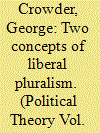

|
|
|
|
|
| Publication |
2007.
|
| Summary/Abstract |
Is the liberal state entitled to intervene in the internal affairs of its nonliberal minorities to promote individual autonomy as a public ideal, or should it tolerate the nonliberal practices of such groups in the name of legitimate diversity? This problem can be fruitfully approached from the perspective of Isaiah Berlin's notion of "value pluralism." According to William Galston, value pluralism privileges a form of liberalism that is maximally accommodating of nonliberal groups and their practices. I agree that pluralism fits best with a liberal political framework, but I depart from Galston's interpretation of what liberal pluralism involves. Taking value pluralism seriously, I argue, implies a form of liberalism in which personal autonomy is a central public ideal
|
|
|
|
|
|
|
|
|
|
|
|
|
|
|
|
| 8 |
ID:
077448
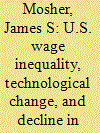

|
|
|
|
|
| Publication |
2007.
|
| Summary/Abstract |
Wage inequality, including the college/high school education premium, has increased substantially in the United States. A key part of the most widely accepted explanation for this is that skill-biased technological change accelerated during this time. This article suggests that the impact of skill-biased technological change was closer to constant in the second half of the twentieth century. This leaves a large unexplained decrease in the college/high school education premium in the 1940s and a large unexplained increase in the 1980s. The current article provides evidence that the upsurge and decline in union power during those respective periods provide a good explanation for these unexplained wage inequality changes.
|
|
|
|
|
|
|
|
|
|
|
|
|
|
|
|
|
|
|
|
|